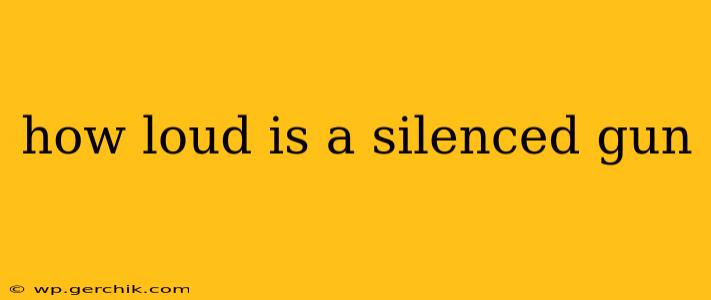The term "silenced gun" is a misnomer. A more accurate term is "suppressed gun," as these devices don't eliminate the sound of gunfire entirely, but significantly reduce it. The loudness of a suppressed firearm depends on several factors, and the reality often differs greatly from Hollywood portrayals. Let's delve into the specifics.
How Much Does a Suppressor Reduce Gunshot Noise?
A suppressor, or silencer, reduces the sound of a gunshot by approximately 20-35 decibels (dB). To put that into perspective, a typical gunshot without a suppressor can register at 150-170 dB. A suppressed gunshot might fall within the range of 115-135 dB. While this is a considerable reduction, it's still significantly louder than a typical conversation (around 60 dB) and can still cause hearing damage with repeated exposure.
What Factors Affect the Loudness of a Suppressed Gun?
Several factors influence the perceived loudness of a suppressed firearm:
-
Caliber of the firearm: Larger calibers produce more sound energy, making suppression more challenging. A .22LR suppressed will be quieter than a .308 suppressed.
-
Ammunition type: The type of ammunition used impacts the overall noise level. Subsonic ammunition (traveling slower than the speed of sound) is significantly quieter than supersonic ammunition when used with a suppressor.
-
Suppressor design and quality: High-quality suppressors designed for a specific caliber will generally offer better sound reduction than cheaper or poorly designed ones.
-
Environmental factors: The surroundings can affect how loud a suppressed gunshot sounds. Shooting in an enclosed space, for example, will amplify the sound compared to shooting in an open field.
What is the Decibel Level of a Silenced Gun?
As mentioned earlier, the decibel level of a suppressed gunshot isn't a fixed number. It ranges considerably depending on the factors listed above. However, you can expect a reduction of 20-35 dB compared to an unsuppressed firearm. This means that while quieter, it's still loud enough to cause hearing damage with prolonged or repeated exposure.
Is a Silenced Gun Still Dangerous?
Yes, absolutely. While a suppressor reduces the noise, it does not reduce the lethal capabilities of a firearm. The bullet retains its full trajectory, speed, and destructive power.
Can You Shoot a Silenced Gun Without Hearing Protection?
No. While quieter, a suppressed gunshot is still exceptionally loud and can cause permanent hearing damage even with short-term exposure. Always wear hearing protection when handling firearms, even suppressed ones.
Are Suppressors Legal?
The legality of suppressors varies by country and even by state within some countries. In the United States, for example, suppressors are legal to own with the proper licensing and registration. However, the regulations are complex and vary significantly depending on location. It's crucial to understand and adhere to the relevant laws in your jurisdiction.
Conclusion: The Reality of Suppressed Firearms
The image of a completely silent firearm is a myth often perpetuated in movies and television. Suppressors significantly reduce the sound of gunfire, but they don't eliminate it. They remain loud enough to cause hearing damage and do not diminish the lethal potential of the weapon. Always prioritize safety and adhere to local laws and regulations concerning firearms and suppressors.
